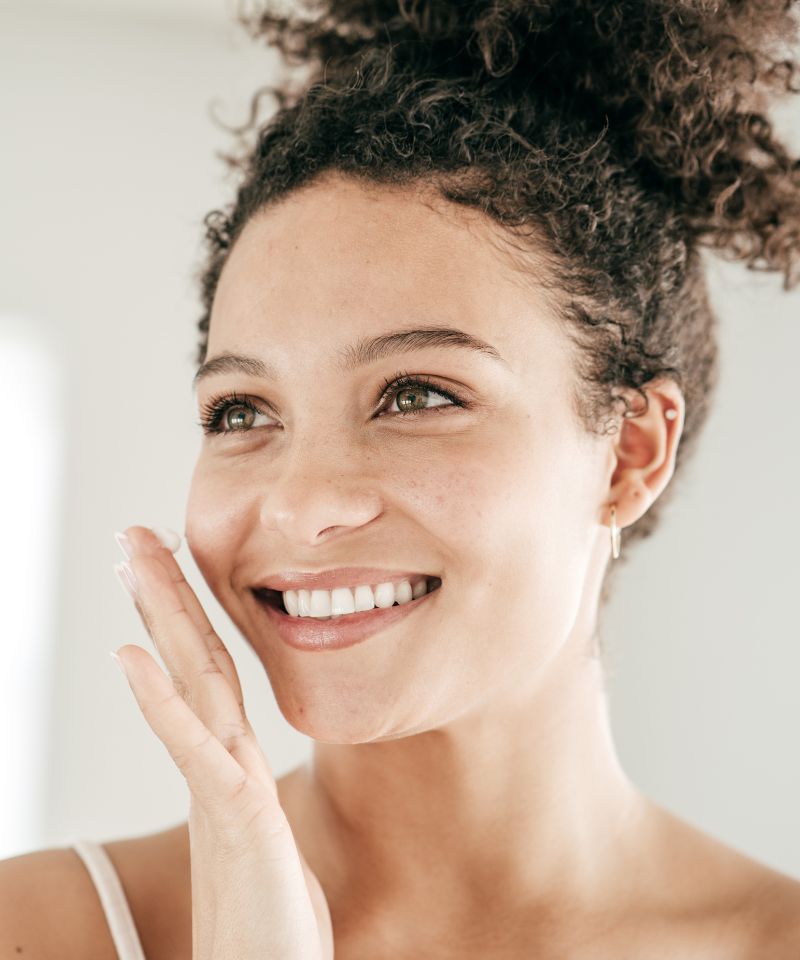Benzoyl peroxide and retinol are popular ingredients that have gained significant attention for their benefits in treating acne and promoting overall skin health.
However, a critical question arises: Can these two powerful ingredients be used together?
And the answer to this is simple: No, benzoyl peroxide and retinol shouldn’t be used together as mixing them can lead to barrier damage and symptoms such as dryness, flakiness, irritation, and exacerbated acne.
In this article, I will discuss how both ingredients work, why mixing them isn’t a good idea, and how to make the most of using each product separately and address your skin concerns effectively.

How Does Benzoyl Peroxide Work?
Benzoyl peroxide is an industrial chemical and one of the most effective components in skincare products formulated to target acne.
Found in cleansers, gels, and creams, benzoyl peroxide has small molecules that travel deeper into the skin and carry oxygen in the pores to destroy the airless environment the acne-causing bacteria thrive in.
This action makes benzoyl peroxide a powerful antibacterial agent that targets moderate to severe acne on the face and body.
Some benefits of benzoyl peroxide include:
- Reducing the overgrowth of acne-causing bacteria inside the skin.
- Reducing inflammation associated with acne.
- Soothing redness caused by acne.
- Refining skin texture caused by bumps and inflammatory lesions.
How Does Retinol Work?
Retinol, derived from vitamin A, is a powerful anti-aging ingredient in many skincare products.
It’s well-known for its ability to fade hyperpigmentation, refine skin texture and reduce the appearance of fine lines and wrinkles.
However, retinol is also an effective anti-acne ingredient, and this action is due to its ability to increase cellular turnover.
Once applied to the skin, the active ingredient travels deeper into the epidermis and binds to specific receptors involved in the skin’s cellular regeneration process.
This action changes how the cells regenerate, promoting an increased rate of cell turnover, which pushes new, healthy skin cells to the surface.
Unlike benzoyl peroxide, which destroys the airless environment inside the pores and kills the acne-causing bacteria, retinol pushes the clogs made up of sluggish dead skin cells the bacteria use to feed on toward the skin’s surface, thus clearing the pores and minimizing inflammation caused by bacterial overgrowth by starving the acne-causing pathogen.
Can You Mix Benzoyl Peroxide and Retinol?
No, benzoyl peroxide and retinol shouldn’t be used together as mixing them can lead to barrier damage and symptoms such as dryness, flakiness, irritation, and exacerbated acne.
Additionally, while there have been concerns about the two ingredients potentially canceling each other and reducing their overall effectiveness, there is little scientific evidence to support this.
Currently, the main concern about why mixing benzoyl peroxide with retinol isn’t recommended is skin irritation that can be caused by mixing the two ingredients.
Benzoyl peroxide and retinol can cause skin irritation when used together because both ingredients can affect the skin barrier.
Benzoyl peroxide is an oxidizing agent that works by releasing oxygen into the pores, killing bacteria, and reducing inflammation.
However, while effective in treating acne, this process can also generate free radicals, which can damage the skin cells and contribute to their degradation.
Additionally, benzoyl peroxide has keratolytic properties, which means it can break down the outermost layer of dead skin cells that hold in moisture.
This action will weaken the skin barrier and lead to enhanced dryness and irritation by causing a temporary increase in transepidermal moisture loss, which is the amount of moisture that evaporates from the skin’s surface.
Retinol, on the other hand, increases cellular turnover and sends young and immature cells that don’t have a developed moisture-holding capacity to the surface of the skin, which results in increased moisture loss and symptoms of dryness, flakiness, and irritation, especially in the beginning while the skin is getting used to this change.
Therefore, combining both ingredients in the same skincare routine can be too much for the skin to handle and can result in a damaged skin barrier and symptoms such as dryness, flakiness, and irritation.
But besides that, another important point to remember is that you don’t need to mix benzoyl peroxide with retinol to treat acne because both ingredients can target this condition on their own.
If your benzoyl peroxide isn’t working and you want to try retinol instead, you should just try retinol and ditch the benzoyl peroxide altogether.
Similarly, if retinol isn’t doing the job or you’re experiencing acne in larger areas of the body, you can either opt for a more suitable option or try a benzoyl peroxide product instead, as this is usually a more affordable alternative that’s more suitable for larger areas of the body.
If you’re trying to address acne, using more than one ingredient that should help you achieve the same result is unnecessary.
And if the only reason why you want to do it is that your current product, be it benzoyl peroxide or retinol, isn’t working on its own, this means that you should find a more suitable product and not mix two ingredients that could potentially cause more harm than good.
The Side Effects of Mixing Benzoyl Peroxide and Retinol
Some of the main side effects of mixing benzoyl peroxide and retinol include:
- Damaged skin barrier.
- Dryness.
- Irritation.
- Redness.
- Flakiness.
- Exacerbated acne.
How to Use Benzoyl Peroxide for Acne?

Benzoyl peroxide is an antibacterial agent, which is why it shouldn’t be a long-term acne solution, but more of a bandaid instead.
This is because, as an antibacterial component, benzoyl peroxide will destroy all bacteria in its path, and this includes both the bad and the good bacteria that are a part of our microbiome and have important roles in maintaining our skin health, including preventing the growth of other, potentially harmful microbes.
This will lead to an imbalance, and with the lack of good bacteria, the bad bacteria can quickly proliferate and cause even more skin issues, including more severe breakouts.
And this is why, although benzoyl peroxide is a fantastic acne-fighting chemical, you shouldn’t try to get your skin used to it, and you should incorporate it into your routine sparingly and slowly minimize use before eventually stopping it when acne is significantly reduced.
This way, you will give the bacteria in your skin a chance to balance out and participate in the healthy functioning of your skin instead of just killing them all off.
How to Use Retinol for Acne?
Unlike benzoyl peroxide, where the goal is to get your skin used off it as quickly as possible, the goal with retinol is to build up a tolerance for long-term use.
This is because retinol works on the cellular level, and its effects are cumulative, meaning it will give better results over time, and the more your skin gets used to it, the healthier it will be and the better it will look.
The right way to use retinol for acne is to start with the mildest concentration your skin can tolerate, as this will slightly decrease the possibility of side effects such as dryness, redness, flaking, and purging, or at the very least, minimize their longevity.
Additionally, when first starting retinol, use it every 48 to 72 hours in the beginning, as this will help your skin get used to the active ingredient without overworking it, and after a few weeks, you can increase the application if needed.
Finally, using a good ceramide moisturizer and sunscreen is crucial when starting retinol, as this will prevent scarring left from old acne from becoming darker and pigmented due to UV rays and help the skin heal faster.

My name is Simone and I am a certified skin specialist. I created this website to teach my readers how to take great care of their skin and I also like to occasionally share my honest opinions on skincare products I’ve tried. You can learn more about me here.
